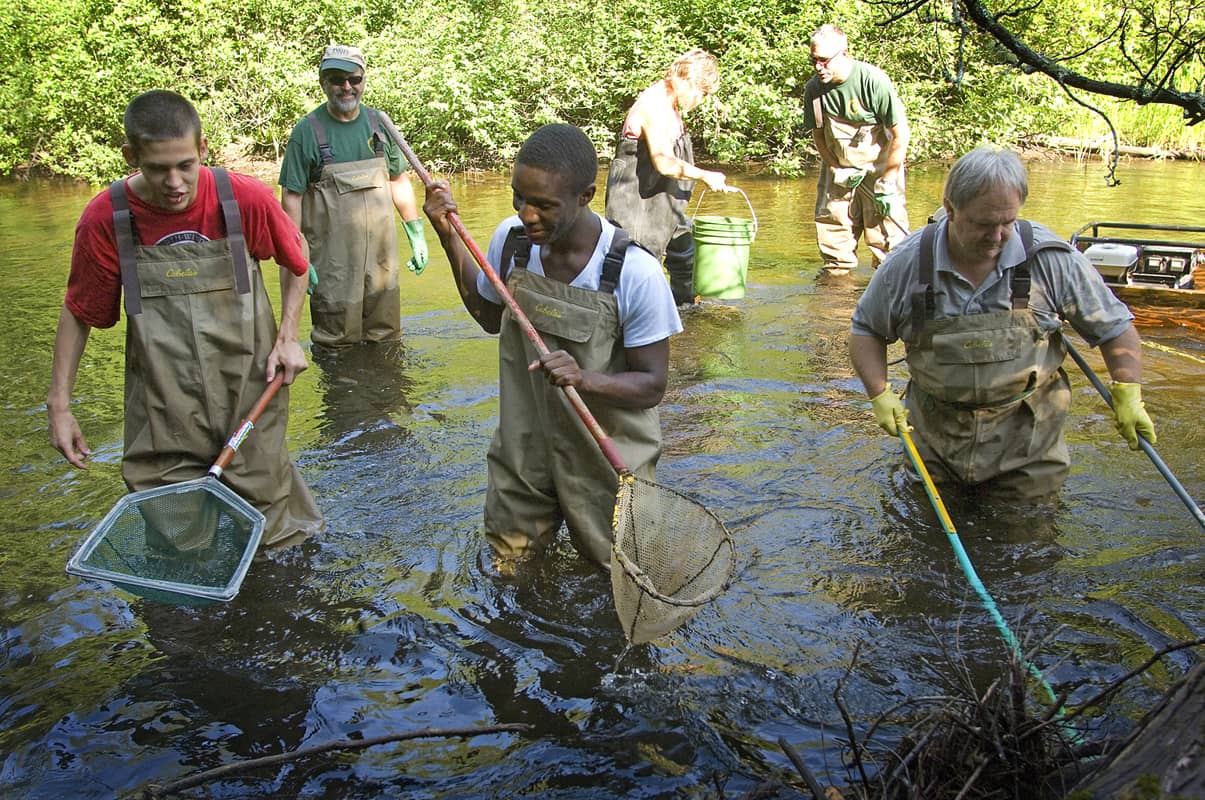DNR Program Offers Nature Ventures to Urban Youth
OutdoorHub 07.21.11

Every summer, the Department of Natural Resources hosts its Academy of Natural Resources for teachers at the Ralph A. MacMullan Conference Center at Higgins Lake, designed to help teachers better understand conservation and fold it into the curriculum. This year, the program took a step in a new direction, hosting 20 high school students in a project dubbed Nature Ventures.
The youngsters – all sophomores to be at Wayne Memorial High School – are part of Upward Bound, a federal program begun during the Lyndon Johnson administration designed to give first-generation college-bound students a boost up the educational ladder.
The students in Upward Bound at Wayne Memorial are considered at-risk, explained Jan Tomlinson, who runs the program. Only about 50 percent of the youngsters who attended the inaugural Nature Ventures event actually lived with one of their parents and only one lived with both. In order to participate, they must commit to maintaining a 3.0 grade point average, doing volunteer work, reading the newspaper, and participating in a six-week summer-learning program. Nature Ventures is part of that summer-learning experience.
The success of the Upward Bound program at Wayne Memorial is unquestioned; 95 percent of the youths in the program – which Tomlinson, a former English teacher, has headed for 17 years – attend college and 84 percent go to on to earn at least a bachelor’s degree.
The program was hatched when Tomlinson saw a television show about Michigan fisheries. She contacted Kevin Frailey, who runs the Academy of Natural Resources. The two put their heads together and Nature Ventures was born.
The three-night stay at the Ram Center for the Wayne Memorial students included instruction in archery and fishing, a day spent with DNR Fisheries Division staffers electro-fishing on the South Branch of the Au Sable River and with DNR Wildlife Division staffers at Porter Ranch learning wildlife management techniques, a field trip to Hartwick Pines State Park and a canoe trip on the Au Sable River.
“We think that exposing these youngsters to natural resources may give them some ideas about a career in conservation,” said Frailey, DNR education services manager. “It’ll be interesting to follow up on them and see if that happened.”
Tomlinson agrees.
“We want them to know there are a lot of opportunities in terms of career,” she said.
Getting to explore those opportunities is half the battle, with Upward Bound youngsters facing numerous obstacles including financial hardship. The Novi Chapter of Safari Club International provided scholarships to make Nature Ventures possible.
Jon Gray – himself an eighth-grade teacher in Lake Orion – put the scholarships together.
“We’d been sponsoring kids to MUCC camp through the George Riley Foundation and this year, instead of sponsoring 80 kids at MUCC camp, we decided to sponsor fewer and put some money into this program,” Gray said. “It seemed like a good fit with our program.”
Gray approached Safari Club International’s foundation to help fund Nature Ventures for three years.
“So far it’s been great,” said Gray, who was on hand to assist with Nature Ventures at the RAM Center. “It fit in well with the SCI’s youth program.
“The kids are reflecting on the peacefulness of nature and self-discovery. It’s something that people who grew up in this environment sort of take for granted.”
The participation of Safari Club was critical, Frailey said. “I wouldn’t be doing this without Safari Club,” he said.
It was almost culture shock for many of the youngsters when they first put on a pair of waders to join Fisheries Division staffers in the Au Sable. The vast majority had never been in waders before. However, by the time the electro-fishing had been completed – when the youngsters had a chance to capture and handle fish — most were enthralled.
“They were getting lit up a little bit,” said Steve Sendek, the DNR fisheries biologist who demonstrated the electro-fishing technique. “You can see how their demeanor changed from this morning until now.”
Tomlinson agreed.
“I think they acclimated very well,” she said.
After electro-fishing, Sendek, spent time showing the youngsters how to identify fish and describing various anatomical features. Then Sendek — along with DNR fisheries technician Ed Melling and Mark Stephens of Michigan State University Extension — collected invertebrates to demonstrate the food chain in a stream and the life cycle of aquatic insects.
“Look at this guy, he’s awesome,” said Stephens, holding out a dragonfly larva to a group of youngsters.
“Get that thing away from me,” said one young lady.
But most of the kids really got into the program.
“I’m an outdoors person,” said Cody Olive, who said he likes fishing with his grandfather. “I’m actually thinking about becoming a conservation officer. It would be doing what I love.”
And that, Frailey will tell you, is exactly the point of Nature Ventures.

